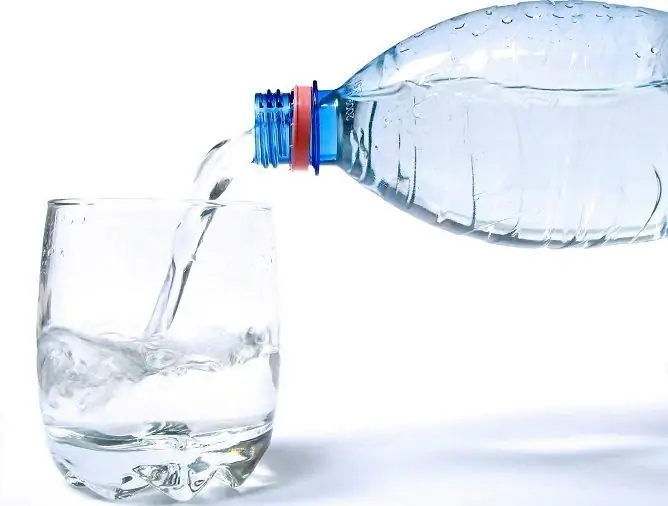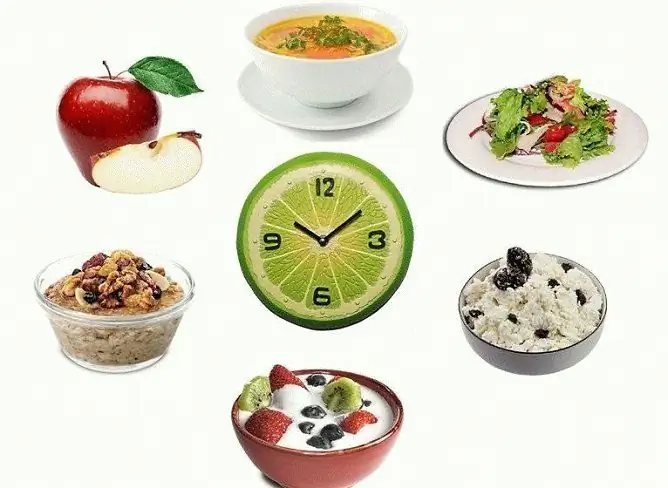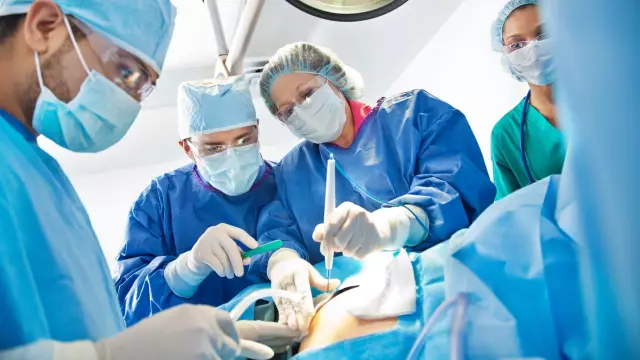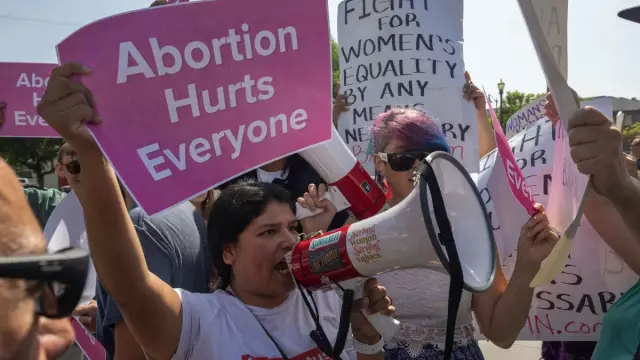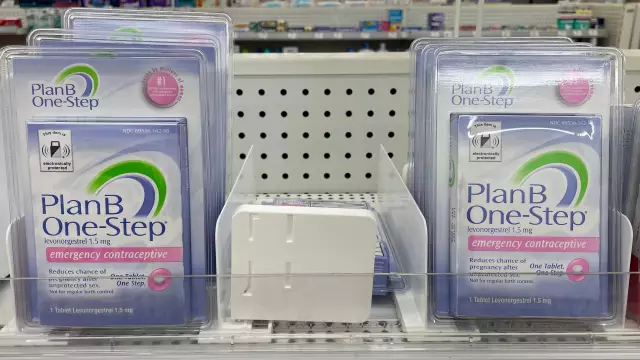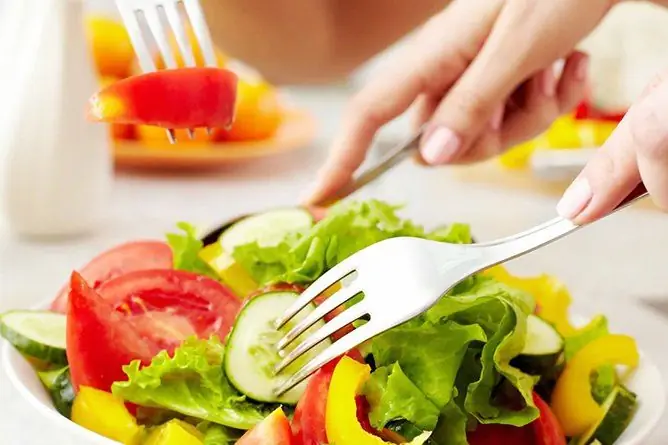- Author Rachel Wainwright [email protected].
- Public 2023-12-15 07:39.
- Last modified 2025-11-02 20:14.
What you can eat after hemorrhoid surgery: food on the first day, in the first month, after a month
The content of the article:
- What can you eat on the first day after the intervention
- What you can eat on the second day after surgery
- The first month after surgery for hemorrhoids: nutrition and its features
- Diet after surgery for hemorrhoids during the rehabilitation period
- Prohibited foods after removing hemorrhoids
- Video
What can be eaten after surgery for hemorrhoids is one of the important questions that are of interest to patients after surgical removal of hemorrhoids. Hemorrhoids is a chronic disease, which is based on the expansion of the cavernous bodies of the end of the rectum. Its main symptoms are difficulty in defecation, burning, itching and pain in the anus, bleeding.
The disease is widespread. According to statistics, in the general structure of proctological morbidity it accounts for about 40%. At the same time, many people with hemorrhoids do not seek medical help in a timely manner. And only with the addition of complications do they come to see a proctologist. In the later stages of the disease, conservative treatment is ineffective, so you have to resort to surgical intervention.

On the first day after surgery for hemorrhoids, it is only allowed to drink water
After surgery to remove hemorrhoids, diet plays an important role in the speedy healing of a surgical wound, restoring natural bowel movements, preventing possible complications and preventing relapse.
What can you eat on the first day after the intervention
On the first day after removal of hemorrhoids, defecation must be avoided, this allows many times to reduce the risk of infection of the postoperative wound and divergence of the sutures. Therefore, a slag-free diet is prescribed to patients a few days before the operation, and cleansing enemas are given in the evening on the eve of the intervention and early in the morning.
For the first 24 hours after surgery, patients are only allowed to drink. It is best to drink warm, still mineral water. You should drink at least two liters of liquid per day.
What you can eat on the second day after surgery
On the 2nd day of the postoperative period, it is allowed to drink the following drinks (without adding sugar to them):
- weakly brewed green tea;
- herbal tea (mint with chamomile, chamomile with nettle and lemon balm)
- decoction of apples.
Toward evening, with the permission of the attending physician, you can porridge cooked in water (wheat, barley or oatmeal). Porridge should have a liquid consistency, be well boiled. It is strictly forbidden to add sugar, milk and butter (butter or vegetable) to them. If the sick person cannot eat the unsweetened porridge, it can be lightly sweetened with one teaspoon of fructose or honey.
The first month after surgery for hemorrhoids: nutrition and its features
Starting from the third day after surgery, the diet is gradually expanded. The main goal of therapeutic nutrition during this period is to create gentle conditions for the intestinal mucosa, contributing to the speedy healing of the surgical wound and ensuring regular soft stools. The diet is based on the following principles:
- the menu includes nutrient-rich, high-quality foods, including vegetable oils (sunflower, hemp, olive);
- the use of any alcoholic beverages, including low-alcohol ones, is prohibited;
- portions should be small (about one handful);
- food is taken six times a day;
- after eating, the patient should not have a feeling of fullness in the stomach.
In the first few days of the postoperative period, patients often have a fear of defecation due to pain in the perineal region. In order to facilitate bowel movement for 3-4 days, they are prescribed a laxative based on lactulose, for example, Duphalac. In the future, regular bowel movements are achieved with a properly composed diet.
What can you eat after hemorrhoid surgery in the first month after surgery? The menu includes:
- boiled or steamed vegetables;
- boiled porridge on the water;
- soups with vegetable broths, especially pureed;
- steamed dried fruits;
- baked apples;
- omelets;
- steam meatballs or cutlets;
- dairy products;
- milk sauce (Bechamel);
- gray bread;
- 1 tablespoon of fructose or honey a day;
- vegetable oils (added to ready-made dishes in small quantities).

Mashed soups in vegetable broth are allowed to be consumed a few days after removal of hemorrhoids
Sample menu for one day:
- breakfast - porridge-spread on water from oatmeal with a teaspoon of olive oil, an omelet from one egg, 2-3 things soaked prunes, unsweetened and weak green tea;
- second breakfast - a glass of low-fat fermented baked milk;
- lunch - vegetable soup with sunflower oil, a slice of gray bread, steamed beef cutlet, 2-3 pieces of soaked prunes;
- afternoon tea - banana;
- dinner - a porridge made from barley groats with a teaspoon of vegetable oil, a piece of steamed fish, a slice of gray bread, herbal unsweetened tea;
- for the night - biscuit or crispbread, a glass of kefir.
Foods that are prohibited to be consumed during the first month after the intervention include sour fruits and vegetables rich in coarse vegetable fibers, for example, cabbage, radish. Any products not included in the approved list are prohibited.
Diet after surgery for hemorrhoids during the rehabilitation period
A month after surgery for hemorrhoids, the surgical wound is completely healed, and patients gradually switch to an extended menu. New dishes should be introduced into the diet gradually, making sure that they do not provoke constipation, diarrhea, and intestinal distention. When drawing up the menu, one should adhere to the principle of complexity, that is, each fish or meat dish should be supplemented with a side dish of boiled, stewed or baked vegetables. The following products are recommended for use:
- stale gray or bran bread;
- all types of cereals, except for semolina;
- durum wheat pasta (no more than twice a week);
- vegetables: tomatoes, cucumbers, cauliflower, broccoli, pumpkin, zucchini, beets;
- fruits: apples, pears, bananas;
- dried fruits: dried apricots, prunes;
- lean meat: beef, turkey, rabbit, chicken fillet;
- low-fat varieties of sea and river fish;
- fermented milk products (any);
- vegetable oil (olive, sunflower);
- compotes, juices, herbal teas, fruit drinks, prepared at home without added sugar.
Fresh vegetable salad is allowed. At the same time, initially it should be consumed in small portions and monitor the body's response. With good tolerance, the volume is gradually increased.
Dried fruits are consumed in a well-soaked form and in an amount of no more than 5-10 berries per day.
Compliance with the water regime is also important. During the day, you should drink at least 2.5-3 liters of liquid (all liquid is considered, including that which is part of soup, compote, tea, etc.). This helps prevent constipation.
Prohibited foods after removing hemorrhoids
After surgical treatment of hemorrhoids in order to prevent recurrence of the disease, it is important that patients adhere to proper nutrition as long as possible (preferably constantly).
Foods that contribute to constipation and irritate the intestinal mucosa should be excluded from the diet:
- so-called junk food (chips, croutons, other snacks, fast food);
- smoked, fatty foods;
- canned food, pates, sausages and sausages;
- butter and other animal fats;
- fresh milk;
- foods and dishes high in starch (potatoes, mashed potatoes, jelly);
- all types of legumes;
- all types of mushrooms;
- red and white cabbage, radish, radish, daikon, onion, garlic, sour leafy vegetables;
- citrus;
- berries and fruits containing small seeds;
- dates and nuts;
- all types of confectionery products, pastries from shortcrust pastry, puff pastry and yeast dough
- white and rye bread;
- hot sauces and any other spicy food, spices;
- cocoa;
- caffeinated drinks (coffee, strong tea, energy drinks, cola);
- alcoholic drinks;
- all kinds of carbonated drinks.
Rice and semolina are allowed on the menu no more than 1-2 times a week in small quantities.

After surgery to remove hemorrhoids, a special diet should be adhered to as long as possible, and even better, make it lifelong
When preparing food, you must refuse to fry. Dishes should be steamed, boiled, stewed or baked.
If there is a strong desire to eat any product from the prohibited list, it is allowed to eat a small amount. If, after this, the functions of the intestines are not disturbed, in the future this product can occasionally be included in the menu.
Video
We offer for viewing a video on the topic of the article.

Elena Minkina Doctor anesthesiologist-resuscitator About the author
Education: graduated from the Tashkent State Medical Institute, specializing in general medicine in 1991. Repeatedly passed refresher courses.
Work experience: anesthesiologist-resuscitator of the city maternity complex, resuscitator of the hemodialysis department.
Found a mistake in the text? Select it and press Ctrl + Enter.

